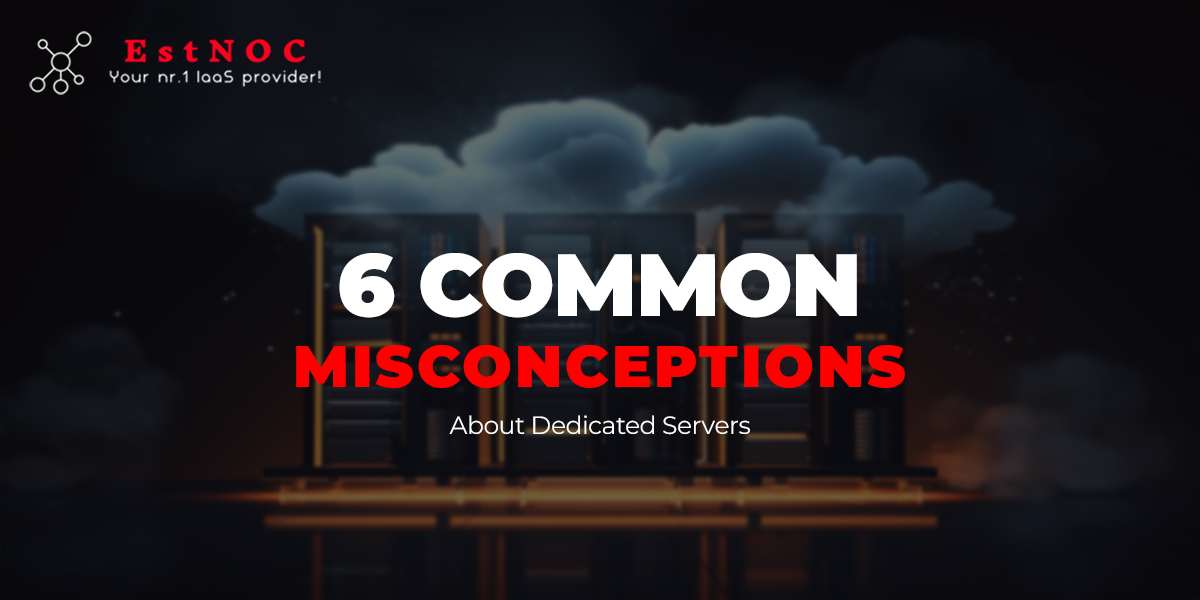10 Strategies for Optimizing....
In the ever-evolving..
By Admin / 13 February

Businesses are turning to dedicated servers to optimize their online operations and enhance performance. However, misconceptions about dedicated servers persist, often causing confusion and hindering well-informed decision-making. Many believe dedicated servers are excessively expensive or overly complex, while others underestimate their value in providing robust security and reliable uptime. Dispelling these myths is crucial for businesses seeking to leverage dedicated services in Estonia, effectively, as they offer tailored solutions for scalability, performance, and control that shared hosting options simply cannot match.
Here, we'll break down six common misconceptions about dedicated servers, providing clarity and helping you make the best choices for your business needs.
A dedicated server is a physical server allocated to a single client, providing control, performance, and security. Its resources are dedicated to the client, ensuring optimal performance and isolating sensitive data and applications from other users. This setup differs from shared hosting, where resources are distributed among multiple users.
Now that we’ve covered the basics, let’s debunk some of the common myths associated with dedicated servers.
Many believe that dedicated servers are prohibitively expensive and suitable only for large corporations with hefty IT budgets. While it's true that dedicated servers cost more than shared hosting, the price is often justified by the benefits they offer. Additionally, the cost of dedicated servers has decreased over the years, making them more accessible to small and medium-sized businesses.
Why Is This a Misconception? Think of it like buying a car. Yes, the initial cost is higher than taking public transportation, but the value you get from owning a car—control, convenience, and the ability to go wherever you want—often outweighs the cost. Similarly, a dedicated server provides unparalleled control, reliability, and performance that can be crucial for a growing business.
The idea that dedicated servers are solely necessary for large enterprises is another prevalent myth. This is invalid. Any business that handles sensitive customer data, runs resource-intensive applications or requires consistent uptime can benefit from a dedicated server.
Why Is This a Misconception? The size of your business doesn't necessarily dictate your need for a dedicated server. Instead, it's the nature of your online operations. For instance, if you're running an e-commerce site, handling high traffic volumes, or need to meet specific security standards, a dedicated server might be necessary regardless of your business size.
Some people shy away from dedicated servers because they think these systems are complex and require a lot of technical knowledge to manage. While dedicated servers do offer more control, many hosting providers offer managed services that handle all the technical details for you.
Why Is This a Misconception? It's similar to owning a high-performance vehicle. You might not know how to tune the engine yourself, but that doesn't mean you can't drive it. Managed hosting services can take care of the technical aspects, allowing you to focus on your business without worrying about server maintenance.
Some businesses think that dedicated servers are overkill for their needs, providing more power and resources than they could ever use. While it's true that dedicated servers offer significant power, this doesn’t mean it's too much for smaller or growing businesses.
Why Is This a Misconception? Imagine you’re hosting a large event. Would you choose a venue that barely fits all your guests, or would you opt for a spacious location with room to grow? A dedicated server is like that spacious venue, offering the flexibility to expand as your business grows.
It's easy to assume that shared hosting is just as effective as a dedicated server, especially if your website is running smoothly. However, this overlooks the potential risks and limitations of shared hosting.
Why Is This a Misconception? Living in a flat is similar to sharing hosting. You share the building's resources with other tenants, which can lead to limitations and issues if someone else is using too much bandwidth. On the other hand, a dedicated server is like owning a house—you have full control and don't have to worry about your neighbors affecting your experience.
There’s a myth that dedicated server services are less secure than other hosting options, possibly because of the perception that managing security on your own server is challenging. In reality, dedicated servers often offer better security, especially when managed by a reputable hosting provider.
Why Is This a Misconception? Think of your server as a vault. If it’s dedicated to just you, it’s easier to secure and monitor. Shared hosting, in contrast, is like sharing a safe with multiple people, increasing the risk that someone else could compromise its security.
Having debunked these misconceptions, it's essential to understand the tangible benefits of dedicated servers. These include:
Choosing the right dedicated server involves considering several factors, including:
Dedicated servers can be a game-changer for businesses of all sizes, providing unmatched performance, security, and control. By debunking these common misconceptions, we hope to have cleared up any confusion and helped you make a more informed decision about whether a dedicated server is right for your business.
Estnoc delivers exceptional web hosting services in Estonia, offering a comprehensive range of solutions to meet diverse needs. Our portfolio includes shared hosting for budget-friendly options, VPS hosting for enhanced control and flexibility, and dedicated servers for high-performance requirements. Additionally, Estnoc provides colocation services for businesses needing secure and reliable infrastructure. With a focus on quality and customer satisfaction, Estnoc ensures that each hosting solution is tailored to support your online presence effectively.